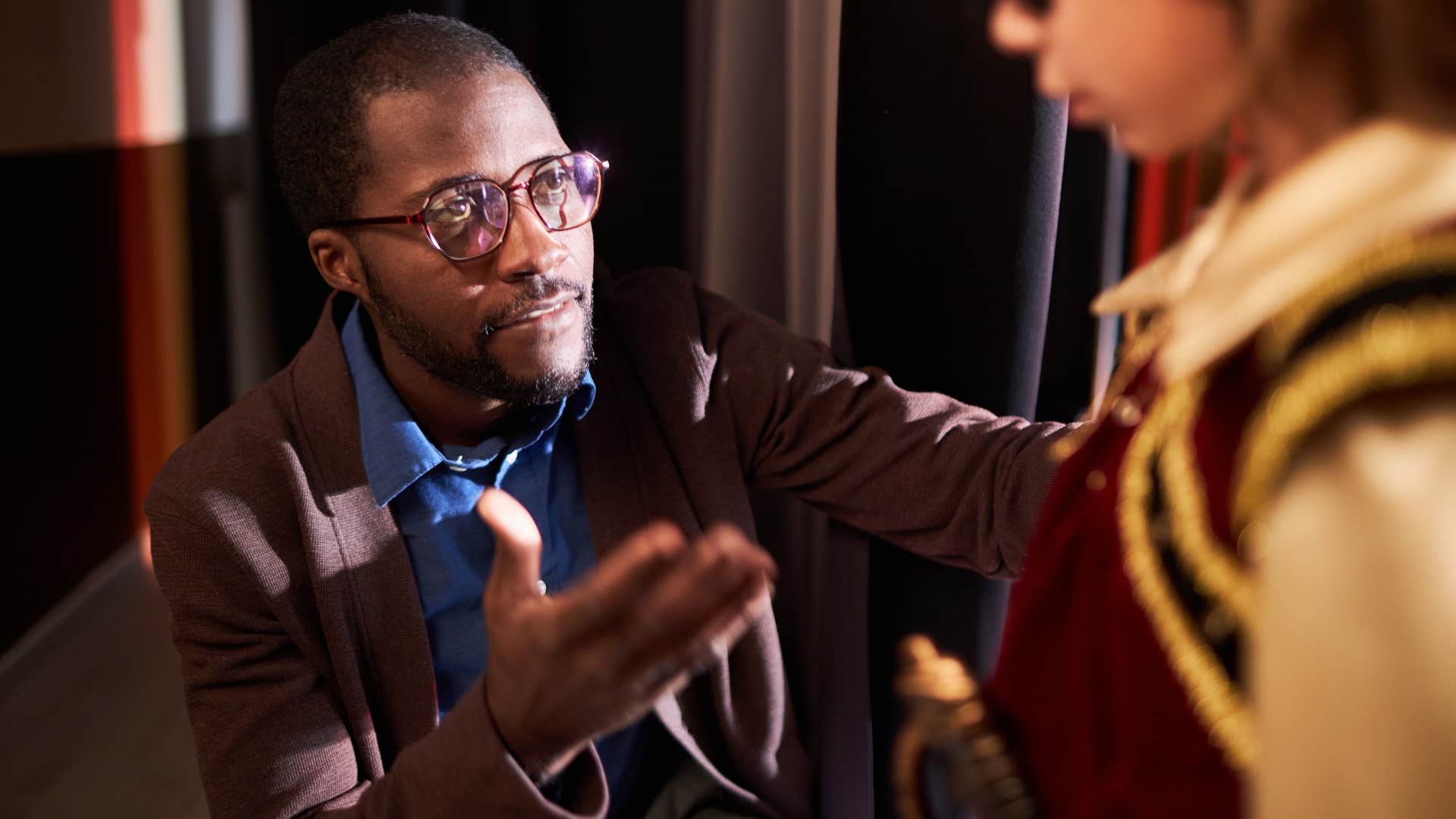11 Phrases People From America Say That Make No Sense To The Rest Of The World
These idioms and slang terms are common for Americans, but just leave everyone else confused.
 Maridav | Shutterstock
Maridav | Shutterstock Similar to slang and lingo across the world, many of the phrases people from America say that make no sense to the rest of the world are rooted in societal norms, trends, comedy, and history that are most relevant to the United States. According to a study from Theory and Practice in Language Studies, American slang reflects American culture, which can make it hard to understand and appreciate in other worldly contexts.
Whether it's used online in the context of social media, internet communities, or in-person, this slang can bond people and spark connections, as a 2025 study explains. But it's typically only when they have shared history or experiences that boost recognition of unique phrases and words.
Here are 11 phrases people from America say that make no sense to the rest of the world
1. 'That's a piece of cake'
 Perfect Wave | Shutterstock
Perfect Wave | Shutterstock
Tied to an unsettling history of injustice and inequality in the United States, even seemingly innocent idioms like "that's a piece of cake" can have deeper meaning hidden in their everyday contexts.
However, from a more innocent perspective, it's also likely that everyday phrases like "piece of cake" that only people from America say are rooted in familiarity. Cake is a simple delicacy, a sweet treat that's commonly and collectively enjoyed, so it's easy to assume this idiom is talking about the joy and simplicity of eating cake.
Regardless, it's one of the phrases people from America say that make no sense to the rest of the world, as people may simply believe they're talking about the dessert.
2. 'Spill the beans'
 PeopleImages.com - Yuri A | Shutterstock
PeopleImages.com - Yuri A | Shutterstock
While the phrase "spill the beans" may historically tie back to ancient Greece, where actual beans were used for voting, it's most commonly used in the United States today when someone tells a secret, dishes out information, or even gossips with their peers.
To "spill the beans" is to share gossip or release a secret, but to people who may not live in the United States or understand the phrase, it seems like something that needs to be literally cleaned up in the kitchen.
3. 'The whole nine yards'
 JLco Julia Amaral | Shutterstock
JLco Julia Amaral | Shutterstock
According to lexicographer Jonathon Green, the roots and history behind the phrase "the whole nine yards" is unclear, but that doesn't mean it's not one of the phrases people from America say that make no sense to the rest of the world.
It's most commonly used in the United States to describe "a whole lot" of something, completing a task, or going "all the way." But in other countries, cultures, and contexts, it may be much less obvious what the phrase actually means.
4. 'Knock on wood'
 Josep Suria | Shutterstock
Josep Suria | Shutterstock
There are a number of theorized explanations behind the phrase "knock on wood," most of which actually originated outside of the United States. From ancient Celtic traditions of knocking on trees to communicate with spirits to games like tag where trees are "safe," the phrase "knock on wood" could be tied to a variety of historical and social experiences.
However, in the modern world, the phrase has become popularized in the United States as a sign of luck. While it's possible other cultures and people may understand the phrase with context, it's largely a tradition and ritual of people in the United States today.
5. 'It's not rocket science'
 Antonio Guillem | Shutterstock
Antonio Guillem | Shutterstock
Used to characterize something relatively easy — within the skillset of the average person — "it's not rocket science" is tied to the expertise and genius of true engineers and scientists in the field, according to linguistic researcher Gary Martin.
With origins tying back to the United States' involvement in the Space Race and actual rocket science engineering in the later 1900s, the idiom "it's not rocket science" is largely an American phrase that makes no sense to the rest of the world.
Of course, alongside context and other phrases like "it's not brain surgery," it's not impossible for people across the world to decode the meaning behind this phrase, but there's no denying its American roots.
6. 'Break a leg'
 SeventyFour | Shutterstock
SeventyFour | Shutterstock
Typically used in the context of art, theatre, and film, the phrase "break a leg" essentially means "do your best." Go out there and do it! Have a great performance! Don't mess up! Regardless of how this idiom is phrased in the context of a conversation, it's one of the sayings people from America say that make no sense to the rest of the world.
Of course, the origins are more complicated than you might imagine, because breaking a leg isn't good luck, right? Experts like Martin suggest that the phrase could be rooted in a number of theatre culture experiences like having to bend your knee to curtsey, pick up coins thrown on stage, or even pass through the "legs" of the stage for a performance encore.
Regardless of where exactly the phrase originated, it's most commonly rooted and used in American society today, especially within the arts.
7. 'That's my jam'
 PeopleImages.com - Yuri A | Shutterstock
PeopleImages.com - Yuri A | Shutterstock
It's not surprising that a phrase like "that's my jam" could be easily misunderstood and misinterpreted by people who don't live in America, as we're not actually talking about fruit jam or food. Despite other idioms that seem to be hyper-centered around food — think: "bread and butter" or "piece of cake" — talking about "your jam" is actually just a conversation about hobbies or something you're good at.
Baking might be your jam. Or, maybe writing and painting is. Regardless of what you're really good at or the hobbies you really enjoy, there's no denying that it's a hyper-American phrase.
8. 'Hit the books'
 PeopleImages.com - Yuri A | Shutterstock
PeopleImages.com - Yuri A | Shutterstock
Associated with American English, phrases like "hit the books" or "in the books" are generally related to education and studying. When you're "hitting the books," you're studying hard or focusing on learning something new.
While the true origin of the phrase is relatively vague, it's quite common amongst generations like Gen X and baby boomers in America, generations that followed a fairly traditional route to success in their adult lives through higher education.
9. 'We're not in Kansas anymore'
 Ground Picture | Shutterstock
Ground Picture | Shutterstock
With roots from the 1939 film "The Wizard of Oz," the phrase "we're not in Kansas anymore" is cemented in American culture. Outside of the arts, it's a reflection of the small town nature of the Southern United States, where going to big cities and meeting people from across the nation is a reminder of how simultaneously small and vast the world truly is.
While it's possible that people from other countries may understand the context of the phrase, it's most commonly used by Americans to signal a change in scenario or an experience that's out of their comfort or familiarity zone.
10. 'Bless your heart'
 fizkes | Shutterstock
fizkes | Shutterstock
A self-proclaimed "Southern thing," the phrase "bless your heart" is most commonly used by people who live or grew up in the Southern United States to express admiration and sometimes ignorance. It's all about the tone, which can easily make it one of the phrases people from America say that make no sense to the rest of the world.
If you're talking to a loved one or expressing love, "bless your heart" can be thoughtful — a reflection of love and affection in a relationship. However, if it's used in a satirical way, with a less convincing tone, it can also be a call-out — characterizing phrases like "bless his heart, he doesn't know any better" or "bless her heart, she's going to get hurt."
11. 'It's not my first rodeo'
 PeopleImages.com - Yuri A | Shutterstock
PeopleImages.com - Yuri A | Shutterstock
If there's something that's inherently rooted in American culture, it's the rodeo. A uniquely Southern activity that's well-known regardless of where you live — as a result of media, film, and culture — the phrase "this isn't my first rodeo" is a signal of experience.
People use this phrase when they're confident to say "I know what I'm doing." While the origins are vague, some tie it back to early films, like the 1981 movie "Mommie Dearest," that have mostly informed American watchers and enthusiasts.
Zayda Slabbekoorn is a staff writer with a bachelor's degree in social relations & policy and gender studies who focuses on psychology, relationships, self-help, and human interest stories.

